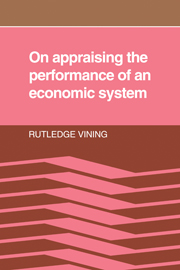 On Appraising the Performance of an Economic System
On Appraising the Performance of an Economic System Book contents
- Frontmatter
- Contents
- Preface
- Part I The circumstances in which the conceptual problems are posed: legislators deliberating upon how well an economic system is working.
- 1 Three main concepts that inhere in the circumstances cited
- 2 On the peculiarities of economics as a descriptive science
- 3 On norms that are implied in observers' adverse reactions to an economic system's performance
- Part II A nation's economy in geographic space and time: on the task of specifying norms of various aspects of it
- References
- Index
2 - On the peculiarities of economics as a descriptive science
Published online by Cambridge University Press: 07 October 2011
- Frontmatter
- Contents
- Preface
- Part I The circumstances in which the conceptual problems are posed: legislators deliberating upon how well an economic system is working.
- 1 Three main concepts that inhere in the circumstances cited
- 2 On the peculiarities of economics as a descriptive science
- 3 On norms that are implied in observers' adverse reactions to an economic system's performance
- Part II A nation's economy in geographic space and time: on the task of specifying norms of various aspects of it
- References
- Index
Summary
What free means, as in free society, and the descriptive problems entailed
Apropos of our starting place in Chapter 1 – Adam Smith's characterization of economics as “the science of the legislator” – and to further relate this with the thought and writings of Knight from whom I think have come the ideas that I am trying to develop, I shall first comment upon two distinctly different meanings of freedom as this author used that word. My intent is to lead up to an expression of the doubt that I have come to feel for the usefulness of such terms as free market system, free enterprise system, laissez-faire – or their supposed contrasts or opposites, planned, mixed, socialist, communist, and the like – as names of alternatives subject to being chosen by or on behalf of a people. Freedom, in the sense of absence of overt constraint, does not now seem to me to be an applicable concept, in that this sense of freedom is not accurately descriptive of what human beings actually experience as freedom and constraint – whereas the actuality of a people's freedom in this other sense does inherently pose the conceptual and descriptive problems of Smith's science.
So far as I understand it, the sense of Knight's usage of the term free society (Knight 1946b: 217), in that usage that is essential to our present inquiry, is in effect the same as the sense of Karl Popper's usage of the term open society (Popper 1971: 173–5). In these contexts, these are the authors' names by which they designate a developed form or “species” of human society.
- Type
- Chapter
- Information
- On Appraising the Performance of an Economic SystemWhat an Economic System is, and the Norms Implied in Observers' Adverse Reactions to the Outcome of its Working, pp. 34 - 65Publisher: Cambridge University PressPrint publication year: 1984


